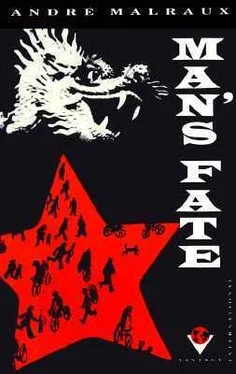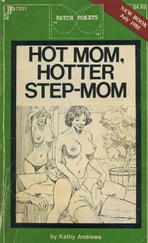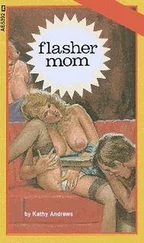“Yes. But in Marxism there is the sense of a fatality, and also the exaltation of a will. Every time fatality comes before will I’m suspicious.”
“A purely Communist slogan, today, would bring about the immediate coalition of all the generals against us: two hundred thousand against twenty thousand. That’s why you must arrange to get along with Chiang Kai-shek in Shanghai. If there is no way, give up the arms.”
“According to that, it was a mistake to start the Revolution of October: how many Bolsheviks were there?” “The slogan ‘Peace’ gave us the masses.”
“There are other slogans.”
“Premature ones. What would they be?”
“Complete, immediate cancellation of farm-rents and credits. The peasant revolution, without conditions or restrictions.”
The six days he had spent coming up the river had confirmed Kyo in his idea: in those clay cities that had squatted on the river-junctions for thousands of years the poor would be as ready to follow the peasant as to follow the worker.
“The peasant always follows,” said Vologin. “Either the worker or the bourgeois. But he follows.”
“No. A peasant movement lasts only by attaching itself to the cities, and the peasantry by itself can only produce a Jacquerie,1 that’s understood. But there is no question of separating it from the proletariat: the suppression of credits is a fighting slogan, the only one which can mobilize the peasants.”
1 A spontaneous, unorganized peasant uprising.
“In short, the parceling of lands,” said Vologin. “More concretely: many very poor peasants are land- o^ners, but work for the usurer. They all know it. Moreover, in Shanghai we must train the guards of the Workers’ Unions as quickly as possible. Allow them to disarm under no pretext. Make of them our force, against Chiang Kai-shek.”
“As soon as that slogan is known, we shall be crushed.” “Then we shall be crushed in any case. The Communist slogans are making headway, even when we give them up. Speeches are enough to make the peasants want the land, speeches won’t be enough to make them stop wanting it. Either we must be willing to participate in the repression with the troops of Chiang Kai-shek-does that suit you? — to compromise ourselves irrevocably, or they will have to crush us, whether they want to or not.” “Everyone in Moscow is agreed that it will be neces- sary-in short, to make the break. But not so soon.” “Then, if it’s above all a matter of being crafty, don’t give up the arms. Giving them up means sacrificing the comrades.”
“If they follow instructions, Chiang won’t make a move.”
“Whether they follow them or not will make no difference. The Committee, Katov, myself, have organized the Workers’ Guard. If you try to dissolve it the whole proletariat in Shanghai will cry treason.”
“Let them be disarmed, then.”
“The Workers’ Unions are organizing of their own accord in all the poor quarters. Are you going to prohibit the syndicates in the name of the International?” Vologin had returned to the window. He dropped his head to his chest, his double chin forming a cushion between them. Night was corning on, full of pale stars.
“To break means certain defeat. Moscow will not tolerate our leaving the Kuomintang at this time. And the Chinese Communist Pany is even more favorable to an understanding with Chiang than Moscow."
“The men at the top only: below, the comrades will not give up all their arms even if you order it. You will sacrifice us, without giving Chiang Kai-shek tranquillity. Borodin can tell that to Moscow."
“Moscow knows it: the order to give up the arms was given the day before yesterday."
Stupefied, Kyo did not answer immediately.
“And the sections have given them up?"
“Half of them-barely. "
Just two days ago, while he was meditating or sleeping, on the boat. He knew, too, that Moscow would maintain its line. His realization of the situation suddenly invested Ch’en’s plan with an obscure value:
“Something else-perhaps the same thing: Ch’en Ta Erh, of Shanghai, wants to execute Chiang."
“Oh! It’s for that!"
“What?"
“He sent word, to ask to see me when you were here."
He picked up a message from the table. Kyo had not yet noticed his ecclesiastical hands. “Why didn’t he have him come up right away?" he wondered.
“A very serious matter. . (Vologin was reading the message.) They all say ‘a very serious matter’. "
“Is he here?"
“Wasn’t he supposed to come? They’re all the same: They almost always change their minds. He’s been here for-in fact-two or three hours: your boat was delayed considerably."
He telephoned the order to have Ch’en sent up. He didn’t like interviews with terrorists, whom he considered narrow, arrogant and lacking in political sense.
“Matters were even worse in Leningrad,” he said, “when Yudenich was before the city, and we managed to pull through just the same. ”
Ch’en entered, also wearing a sweater, passed before Kyo, sat down facing Vologin. The noise of the printing-press alone filled the silence. In the large window at a right angle to the desk the darkness, now complete, separated the profiles of the two men. Ch’en, his elbows on the desk, his chin in his hands-stubborn, tense-did not move. “Man’s complete impenetrability takes on something inhuman,” thought Kyo as he looked at ^rn. “Is it because we easily feel a sense of contact through our weaknesses?. ” Once he had got past his surprise he judged it inevitable that Ch’en should be here, that he should have come to affirm his decision himself (for he did not imagine that he would argue). On the other side of the rectangle of starry night stood Vologin, strands of his forelock falling over his face, his fat hands crossed on his chest, also waiting.
“Did he teU you?” asked Ch’en, indicating Kyo with a motion of his head.
“You know what the International thinks of terrorist acts,” Vologin answered. “I’m not going to make you- in short, a speech on that subject.”
“The present case is special. Chiang Kai-shek alone is sufciently popular and sufficiently strong to hold the bourgeoisie united against us. Do you oppose this execution, yes or no?”
He remained motionless, leaning on the desk with his elbows, his chin in his hands. Kyo knew the argument had no essential validity for Ch’en, even though he had come here. Destruction alone could put him in accord with himself.
“It’s not up to the International to approve your plan.” Vologin spoke in a matter of fact tone. “Moreover, even from your point of view. ” Ch’en still did not move “. is the moment, in short, well chosen?”
“You prefer to wait until Chiang has had our people murdered?”
“He will make decrees and nothing more. His son is in Moscow, don’t forget. And there’s also this: a number of Galen’s Russian officers have not been able to leave Chiang’s staff. They will be tortured if he is killed. Neither Galen nor the Russian staff will countenance it. ”
The question has apparently been discussed right here, thought Kyo. There was something indescribably futile and hollow in this discussion, which made him uneasy: he found Vologin singularly more determined when he ordered the arms to be given up than when he spoke of the murder of Chiang Kai-shek.
“If the Russian officers are tortured,” said Ch’en, “it can’t be helped. I also will be tortured. Of no interest. The millions of Chinese are surely worth fifteen Russian officers. Good. And Chiang will abandon his son.”
“What do you know about it?”
“And you? You undoubtedly won’t even dare to him.”
Читать дальше











